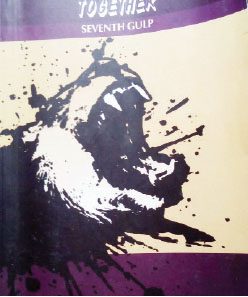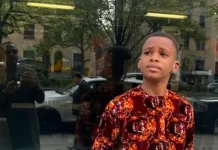Author: Rex E. Odoemenam
Reviewer: Mature Tanko Okoduwa
Publisher: SeeFar Books
Year: 2015
Pages: 208
Rex E. Odoemenam has written a timeless book. Free-flowing, sweet and breath-taking, the book is written from the mind of a sage, Ekwedike. The fluidity of the book makes for a continuous longing, not knowing what will happen next in the story.
Reading Far Together: Seventh Gulp for the first time, something unique and unusual caught my attention, and curiosity. Unlike most books published by creative writers in Nigeria that usually fall within the three genres of literature: poetry, prose and drama, Far Together: Seventh Gulp is a combination of all and even more. In it, one finds short stories, some linked to become one, review, essay, et cetera.
Books like this are normally in the form of anthologies in Nigeria, as the case of Okike that was published for decades at the University of Nigeria, Nsukka (UNN).
The Association of Nigerian Authors (ANA) has published so many titles in this regard, like Volcano of Voices, Camouflage, 25 Nigerian Poets, ANA Review, and others by individuals.
Far Together: Seventh Gulp is written in back and forth stance, in a dream-like state, and it has a way of instantly taking the reader on a journey of enquiry, of hoping to fill the void and wanderings: “Still I never did break free from the clutches of my other world activities; my trance, my daylight dream. As I struggled to grab hold of reality” (p.59).
The book, autobiographical in nature, is set in the mind of one of the minor characters, Ekwedike, as told by the narrator who recalls his upbringing under a wise Onyema, the great storyteller. This is evident through the following words: “… it was from this land of my youth – my birth, where I could count my father’s genealogy to the tenth generation that I departed …” (p.94).
Onyema happened to be an epitome of a strong African tradition. He has a rich reservoir. Ironically, his wisdom is a far cry to that of Ekwedike, who eats proverbs and blends them so well to give more meaning to the story. This technique helps to set the ball rolling and creates musicality.
“Does not the mad person serve a usefulness? Is there no use for madness” (p.67).
The above captures what the people of Amala have to say when they send emissaries to the village of Oloko on hearing of the death of Cocoa-yam, upon his falling into their river and his body discovered without some of his genitals. Cocoa-yam’s mother laments:
“Is a sick child not a child anymore?
Is a sick son not a son anymore?
Is a sick person not human anymore?
See what they did to me,” she constantly cried resulting in the people of Amala rising to her defence.
Those that read Chinua Achebe’s Things Fall Apart and Chimamanda Adichie’s Purple Hibiscus and enjoyed them will definitely find pleasure reading Odoemenam’s Far Together: Seventh Gulp because of his choice of English words, interlaced with Igbo language. Like when Onyema pours his anger on Ulonna for coming back late from the church. When the flogging becomes too much for Ulonna to bear, Abiche, Onyema wife, tries in vain to stop him thus: “Biko, Ozuolanu, hapukawanu – please, it is okay, that much you have beaten him is okay” (p.58). The use of “Hah, Chineke” (p.56), “tufiakwa – God forbid” (p.64) are good examples.
The fluidity of this book is as a result of Ekwedike’s rich reservoir of knowledge, retentive memory and his ability to paint it on a vast canvas narrative that relates to so many of the things that generations both past and present can identify with, relate to and learn from. The descriptive power of the author is never in doubt.
With this book, Odoemenam has broken literary barriers. But I strongly believe that Far Together: Seventh Gulp would have made more sense if it reads purely as prose rather than the inclusion of other genres like poetry, review and others that tend to slow down the natural flow of the book – as it creates an unusual pause here and there.
However, this book is going to be among the timeless works, in the ranks of the literary heavyweights. So many readers and authors will proudly display this book on their shelves or place it on top of the low drawer beside their bed.
• Okoduwa is a Lagos-based writer.













